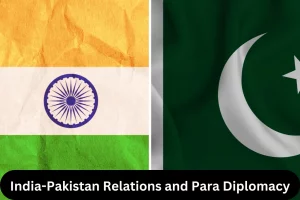ForumIAS announcing GS Foundation Program for UPSC CSE 2025-26 from 18th June. Click Here for more information.

Source-This post on India-Pakistan Relations and Para Diplomacy has been created based on the article “C Raja Mohan writes: A time for para diplomacy” published in “The Indian Express” on 22 May 2022.
UPSC Syllabus-GS Paper-2-International Relations- India and its Neighborhood- Relations.
Context– The article discusses the Shiromani Akali Dal’s (SAD) promise to negotiate with the Centre for an “exchange of territory” with Pakistan to get back Kartarpur Sahib, the final resting place of Guru Nanak.
The article suggests that instead of changing territorial boundaries, the focus should be on transforming these frontiers from zones of military confrontation into areas of commercial cooperation. India-Pakistan Relations and Para Diplomacy
What are the challenges in India-Pakistan economic cooperation?
1) Pakistan’s military establishment has shown little interest in economic cooperation with India, especially until the Kashmir issue is resolved to its satisfaction.
2) Pakistan has not granted Most Favored Nation (MFN) status to India and suspended trade ties following incidents like the Pulwama terror attack and India’s revocation of Jammu and Kashmir’s special status.
What steps can be taken to address this?
1) Push to cross-border trade- There is a need to open the Hussainiwala borders with Pakistan for trade and tourism to boost economic prosperity.
2) Transborder economic zones-These have gained traction in Southeast Asia and China is also encouraging cross-border collaboration in its frontier provinces. Thus,there can be the creation of a “special economic zone” along the entire Punjab border in collaboration with Delhi that will attract small and medium enterprises.
3) Deploying para diplomacy-Para diplomacy involves formal interactions between entities below the federal level, such as provincial and local governments, to pursue shared national goals. It can complement the engagement by national governments and potentially generate openings that are not achievable at the national level.
What should be the way forward?
1) Regardless of which party is in power, the government should rethink using para diplomacy as an important part of India’s diplomacy.
2) India’s neighborhood policy should consider the needs of people living in border areas. This means that both the central government and regional parties must agree on how to build positive relationships with neighboring countries.
Question for practice
What is para-diplomacy? How can India deploy it improve its relationship with bordering countries?



